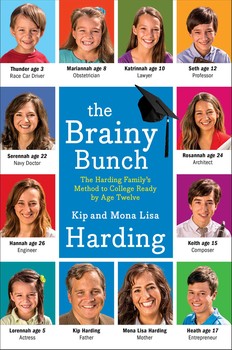
17 Jun “The Brainy Bunch”: A review
Last week I read a book, a whole book.
(Pause for applause.)
Okay, I’m not the veracious and speedy reader that my wife, Ruth, and daughter, Marissa, are. I pretty much stick to professional articles and only dive into an actual book if I anticipate getting some great value from it. It turns out I chose well last week.
“The Brainy Bunch: The Harding Family’s Method to College Ready at Age Twelve” came to my attention after reading a short article about their approach to educating their children. As stated by the subtitle, this book is a discussion of how Kip and Mona Lisa Harding (yes, that is her real name)have helped each of their children to begin college before entering their teens.
At first I assumed these kids were “brainiacs”—naturally brilliant children whose parents drove them to over-perform at every turn. I was quite pleasantly surprised to learn that the children are of average intelligence, and that their parents placed family activities and service to others above academics. Though I found it interesting that each of the children has begun college no later than twelve, I was more intrigued by the lessons about family creating a family culture that seems to have helped each to thrive in areas that really matter.
Kip and Mona Lisa have ten children, spanning ages twenty-six down to three. Their three older daughters began private school and did reasonably well. But when Kip’s job allowed Mona Lisa to stop working outside of the home they decided to try home schooling. As they put it, the decision was based primarily upon their assumptions that knowing and loving their children would best equip them to recognize and respond to the children’s needs.
They used pre-made packets of materials for teaching and testing each child according to grade level. But when their oldest, Hannah, was four her father tried to entertain her by teaching her how to “differentiate equations”. She was not exceptionally bright, but responded to the individual time and attention of a father. This was the beginning of creating a culture of learning and teaching.
Each day the children spend time reading, writing and exploring topics of interest. They are encouraged to use the computer to find online information to find questions to their questions. Around the dinner table mom and dad have genuine discussions about interesting and perhaps controversial topics. Children are expected and encouraged to be active participants in these discussions.
Early college entrance only began when they found that 12-year old Hannah could take a math class on campus when her own math skills had surpassed her parents’. She attended this and subsequent classes of interest while mom and siblings walked the adjacent track, complete with baby stroller.
Each child was encouraged to take college courses when they were ready for the subjects and had the interest. This eventually resulted in each attending and doing very well in college courses no later than twelve. Heath even graduated with a masters degree at seventeen.
I was surprised, however, to see that the Hardings actually spent much less time doing school work than our children do in public school. This family begins each day by cleaning their rooms and getting ready for the day before breakfast, doing a few household chores and studying the Bible together before beginning their academic studies.
Because each child is encouraged to read, write and explore with guidance from parents their natural curiosity is both stoked and rewarded. With practice it has taken surprisingly little effort for parents to encourage growth. But they have successfully created a culture where exploration, learning and growth have taken hold in every member.
This book left me a little jealous that we had not taken more opportunities when our own children were young. It also left me wondering about the wisdom of turning over the education of our most valuable and vulnerable members, and separating learning from living.
Even if you have no interest in home schooling or in accelerating your child’s advanced education I recommend this book for encouraging and empowering parents to be more active participants in their children’s lives and bringing out the very best that each has to offer.
Michael D. Williams is a licensed psychotherapist, a Marriage and Family Therapist with over 25 years’ experience. Please offer your comments, feedback and suggestions or read other articles at MichaelWilliamsCounseling.com, or call him at 208.360.2365.
